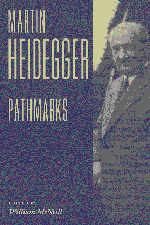Book contents
- Frontmatter
- Dedication
- Contents
- Editor's Preface
- Preface to the German Edition
- Comments on Karl Jaspers's Psychology of Worldviews (1919/21)
- Phenomenology and Theology (1927)
- From the Last Marburg Lecture Course (1928)
- What Is Metaphysics? (1929)
- On the Essence of Ground (1929)
- On the Essence of Truth (1930)
- Plato's Doctrine of Truth (1931/32, 1940)
- On the Essence and Concept of Φύσιζ in Aristotle's Physics B, I (1939)
- Postscript to “What Is Metaphysics?” (1943)
- Letter on “Humanism” (1946)
- Introduction to “What Is Metaphysics?” (1949)
- On the Question of Being (1955)
- Hegel and the Greeks (1958)
- Kant's Thesis about Being (1961)
- Notes
- References
- Editor's Postscript to the German Edition
Phenomenology and Theology (1927)
- Frontmatter
- Dedication
- Contents
- Editor's Preface
- Preface to the German Edition
- Comments on Karl Jaspers's Psychology of Worldviews (1919/21)
- Phenomenology and Theology (1927)
- From the Last Marburg Lecture Course (1928)
- What Is Metaphysics? (1929)
- On the Essence of Ground (1929)
- On the Essence of Truth (1930)
- Plato's Doctrine of Truth (1931/32, 1940)
- On the Essence and Concept of Φύσιζ in Aristotle's Physics B, I (1939)
- Postscript to “What Is Metaphysics?” (1943)
- Letter on “Humanism” (1946)
- Introduction to “What Is Metaphysics?” (1949)
- On the Question of Being (1955)
- Hegel and the Greeks (1958)
- Kant's Thesis about Being (1961)
- Notes
- References
- Editor's Postscript to the German Edition
Summary
PREFACE
This little book contains a lecture and a letter.
The lecture “Phenomenology and Theology” was given on March 9, 1927, in Tübingen and was again delivered on February 14, 1928, in Marburg. The text presented here forms the content of the immediately reworked and improved second part of the Marburg lecture: “The Positivity of Theology and Its Relation to Phenomenology.” In the Introduction to Being and Time (1927) §7, pp. 27ff., one finds a discussion of the notion of phenomenology (as well as its relation to the positive sciences) that guides the presentation here.
The letter of March 11, 1964, gives some pointers to major aspects for a theological discussion concerning “The Problem of a Nonobjectifying Thinking and Speaking in Today's Theology.” The discussion took place at Drew University in Madison, New Jersey, on April 9–11, 1964.
These texts were published for the first time in Archives de Philosophie, vol. 32 (1969), pp. 356ff., with an accompanying French translation.
This little book might perhaps be able to occasion repeated reflection on the extent to which the Christianness of Christianity and its theology merit questioning; but also on the extent to which philosophy, in particular that presented here, merits questioning.
- Type
- Chapter
- Information
- Pathmarks , pp. 39 - 62Publisher: Cambridge University PressPrint publication year: 1998
- 7
- Cited by



